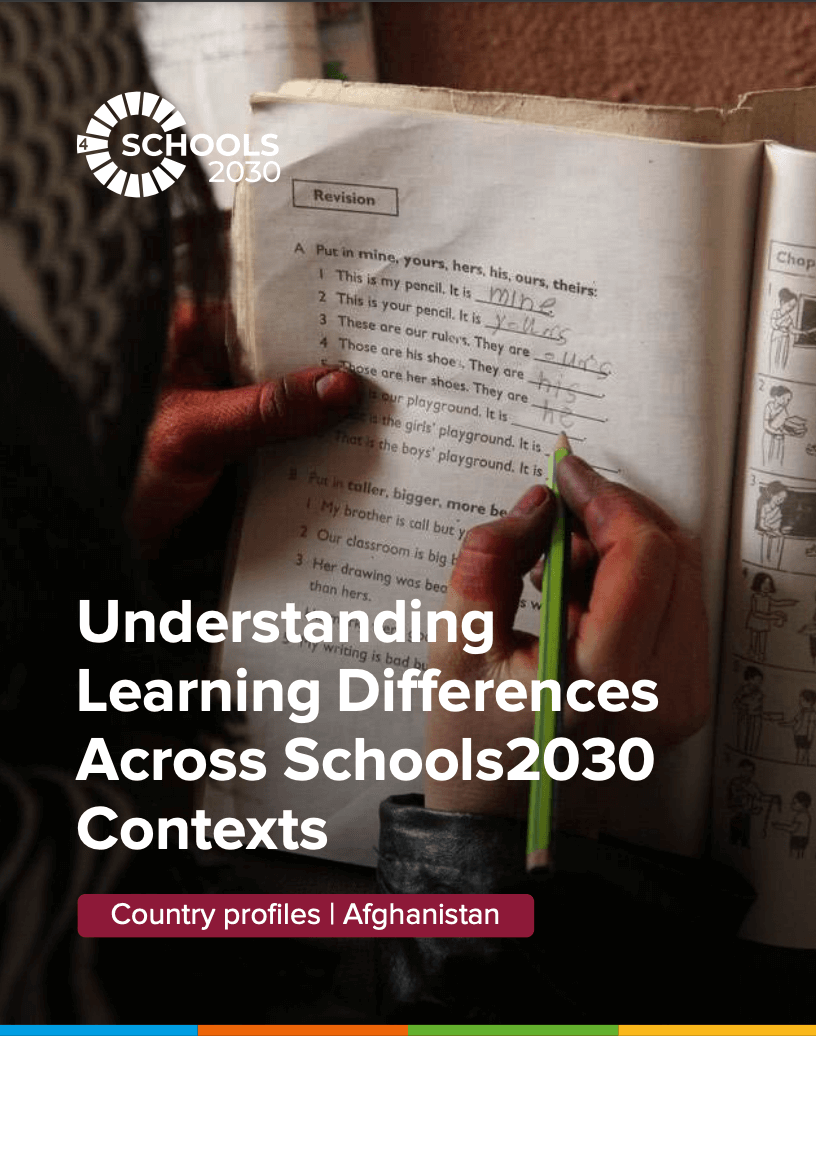Schools2030 AFGHANISTAN
Supporting teacher professional development in Baghlan, Bamyan and Badakhshan provinces.
Schools2030 Afghanistan currently works with 100 classrooms across 34 schools and 22 pre-primary institutions – approximately 330 teachers in total are part of the programme. When a school joins the programme, a design team is selected by the school leadership and consists of 6-8 members. Design teams all undergo a series of assessment and Human-Centred Design (HCD) trainings to prepare them to take part in the programme. In its inception phase, Schools2030 Afghanistan was working primarily in remedial or community-based classes, but now it is operational in schools across the three provinces.
Each cycle of HCD begins in May and June each year, with a six-day inception workshop, during which the design teams work through the six first steps of the HCD process. During this workshop, the teams become familiar with how to identify the challenges they face using interview techniques and the Schools2030 assessment tools. This prepares them for identifying appropriate challenges for which they can co-create solutions that can be implemented and tested in their classrooms.
Show More
Since Schools2030 entered Phase 2 (2024-2026), the team in Afghanistan is looking at expanding the uptake of their methodology outside of the schools that were initially targeted. They have begun to seek out teachers from other schools and members of Teacher Professional Development Units (bodies that work alongside schools to support teacher professional development and the implementation of the curriculum) to engage them in the trainings. So far, they have included 121 participants from neighbouring schools and 51 from teacher professional development units. By working with these teachers, the team can further test Schools2030’s methods and tools outside of the initial programme schools. Schools2030 design teams report that teachers from these other schools frequently meet with them and ask technical questions about the HCD process. The professional development unit team collects information about successful solutions and incorporate the practices into teaching models.
Our Team in AFGHANISTAN

Najibullah Montahez
Schools2030 National Coordinator and National Advisor, Education

Janali Entezar
National Lead, Education

Rayana Fazli
National Programme Manager, Education

Atiqullah Ludin
National Director, Education

Muhammadullah Omari
Assessment and Learning Coordinator, Schools2030
The Afghan Education Context
Afghanistan is a land-locked, mountainous country in Central Asia, often referred to as “the crossroads of Asia”. The population is roughly 40 million, with nearly three-quarters of Afghans living in rural areas. A large proportion of its population (46%, or 18 million) are youth under 15 years of age.
Show More
Political unrest and upheaval has led to a number of educational challenges for Afghanistan: an estimated 4.2 million children are out of school, 60% of whom are girls. Fewer than 40% of girls were enrolled in secondary schools before the Taliban takeover of governance. Since late 2021, secondary school education for girls has been constrained and many schools, early childhood development (ECD) services and community-based education centres have been closed due to a freeze in international aid. There has also been an alarming deterioration in boys’ access to education and the quality of their education in general with serious implications for them and their families, but also for the country’s future, including with respect to the overall human rights situation in Afghanistan. Teacher training and professional development opportunities for both school and ECD sectors remain limited.
Despite these many challenges, the education system in Afghanistan remains focused on three key areas: quality and relevance, equitable access, and efficient and transparent management. Education stakeholders in the country are working to bridge humanitarian and development work in education. The aim is to reach those furthest left behind and enable long term change while also addressing immediate needs.
Despite these myriad pressures, the work of Schools2030 with communities in Afghanistan has been ongoing, supporting and training Afghan educators in both human-centred design (HCD) and holistic learning assessment.
The Afghanistan Education Context
Afghanistan is a land-locked, mountainous country in Central Asia, often referred to as “the crossroads of Asia”. The population is roughly 40 million, with nearly three-quarters of Afghans living in rural areas. A large proportion of its population (46%, or 18 million) are youth under 15 years of age.
Political unrest and upheaval has led to a number of educational challenges for Afghanistan: an estimated 4.2 million children are out of school, 60% of whom are girls. Fewer than 40% of girls were enrolled in secondary schools before the Taliban takeover of governance. Since late 2021, secondary school education for girls has been constrained and many schools, early childhood development (ECD) services and community-based education centres have been closed due to a freeze in international aid. There has also been an alarming deterioration in boys’ access to education and the quality of their education in general with serious implications for them and their families, but also for the country’s future, including with respect to the overall human rights situation in Afghanistan. Teacher training and professional development opportunities for both school and ECD sectors remain limited.
Despite these many challenges, the education system in Afghanistan remains focused on three key areas: quality and relevance, equitable access, and efficient and transparent management. Education stakeholders in the country are working to bridge humanitarian and development work in education. The aim is to reach those furthest left behind and enable long term change while also addressing immediate needs.
Despite these myriad pressures, the work of Schools2030 with communities in Afghanistan has been ongoing, supporting and training Afghan educators in both human-centred design (HCD) and holistic learning assessment.
THE THREE-STEP MODEL IN AFGHANISTAN
ASSESS
In early 2021, a workshop conducted by MAGENTA Consulting which brought together representatives from the Ministry of Education, Schools2030’s education partners and Aga Khan Foundation staff, during which the priority domains for Schools2030 Afghanistan were selected for each age group. As a result, learning outcomes were selected, covering knowledge and skills that are priorities for young people in Afghanistan, including communication, creativity and collaboration.
Schools2030 Afghanistan then worked alongside MAGENTA, and Global Assessment partners Oxford MeasurEd and Save the Children, to create bespoke, contextualised and translated learning outcome tools and tools to measure the quality of the classroom environment for each age group. Teachers and school leaders were involved at each stage of the process to ensure their comfort and buy-in.
To date, several hundred teachers have piloted these tools and given feedback on their usability and usefulness. They are now being used across all the schools involved in the programme to assess student learning and support teachers as they embark on their design journeys.
Priority Learning Domains
AFGHANISTAN
PRE-SCHOOL
- Literacy
- Numeracy
- Arts & Culture
- Health & Nutrition
- Relationship Building
PRIMARY SCHOOL
- Literacy
- Numeracy
- Science
- Creativity
- Relationship Building
SECONDARY SCHOOL
- Literacy
- Numeracy
- Science
- Ethical Decision-Making
- Relationship Building
Access examples of assessment tools
from across our programme countries.
All these tools are available free to download below and will continue to be refined and iterated to ensure robust psychometric validity.
Schools2030 has been a game-changer. It’s research-based and it has allowed me to find out what my students really need.
Ghulam Abas Haidari, Teacher, Afghanistan
INNOVATE
The ‘Innovate’ step is at the heart of the design journey for teachers involved in the programme. Using the assessment data and the HCD methodology provided by Schools2030, the teams have so far produced over 60 innovative practical solutions that are being tested and refined in classrooms. The HCD process has helped teachers to identify factors that might be creating barriers to academic success and they have developed these innovations accordingly. AKF is provides targeted funding so that these innovations can be implemented and tested for efficacy across a range of classrooms.
Download our Dari-language HCD Tools for Afghanistan to start creating education innovations in your school.
Schools2030 Human-Centred Design Toolkit: Afghanistan
Sprint version
Schools2030 Human-Centred Design Facilitator Guide: Afghanistan
SHOWCASE
Schools2030 Afghanistan holds district, provincial and national showcase events yearly, in the three provinces in which it is present – Bamyan, Baghlan, and Badakhshan – and in the capital, Kabul. At each event, teachers are invited to share the ideas and innovations they have been working on through Schools2030 with other teachers, other Schools2030 design teams and representatives from local and national government bodies. At school and district level, Shura members, community elders, parents and students are also invited to attend. At the events, design teams from individual schools come together, describe their solutions, present their implementation methodologies, and highlight their student’s learning outcomes improvement evidenced by baseline and end-line assessment.
Teachers also regularly upload their practices and innovations to the Faved platform so that other teachers can learn from them. Additionally, for the last three years, staff from Schools2030 Afghanistan have travelled to the Schools2030 Global Forum to present ideas on behalf of teachers who are unable to attend in person.
News and stories from Afghanistan
IMPACT AND LEARNING
Afghanistan
We regularly produce learning and research reports that inform and strengthen our programme delivery. Read and share our latest learnings for Afghanistan or click below to browse all our reports.

English Version

Dari Version

Learning Report 2024
Explore Schools2030 in our other countries.








